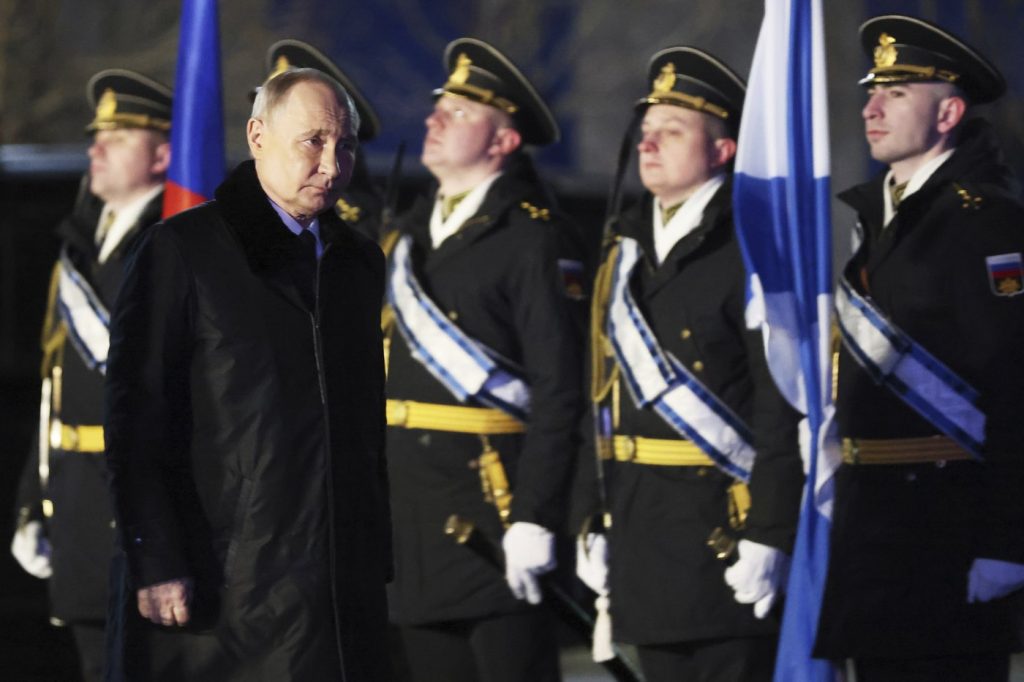On a Friday, Russian President Vladimir Putin proposed the idea of placing Ukraine under external governance, facilitated by the United Nations, as part of efforts to achieve a peaceful resolution to the ongoing conflict. This statement, made during a televised address to the crew of a Russian nuclear submarine, underscores the Kremlin leader's commitment to fulfilling his war objectives.
Putin reiterated his assertion that Ukrainian President Volodymyr Zelenskyy, whose term expired in the previous year, lacks the legitimacy necessary to ink a peace agreement. He pointed out that, according to Ukraine’s constitution, conducting national elections is illegal while the country is under martial law. He expressed concerns that any agreements reached with the current Ukrainian administration could face challenges from future governments and noted that new elections could take place under external governance.
“Under the auspices of the United Nations, including the United States, as well as European nations, and of course, our partners and friends, we could discuss the possibility of establishing temporary governance in Ukraine," Putin declared. He emphasized that this arrangement would enable the nation to conduct democratic elections, thereby bringing a trustworthy government to power, which could then negotiate a peace treaty.
Putin described this external governance as merely “one of the options,” without providing additional details. His comments coincided with the conclusion of a summit hosted by French President Emmanuel Macron, which explored potential troop deployments to Ukraine to secure a future peace agreement. Macron highlighted that “several” other nations are interested in joining France and Britain in such a force.
In response, Russia threatened to reject any presence of NATO troops as part of a potential peacekeeping mission. Macron, alongside other summit attendees, accused Russia of feigning interest in a negotiated settlement. U.K. Prime Minister Keir Starmer stated, "They are playing games and they’re playing for time,” stressing the necessity to prevent further delays while Russia continues its invasion.
Despite a preliminary, U.S.-brokered agreement to halt strikes targeted at energy infrastructure, both Russia and Ukraine quickly traded accusations of violations, illustrating the difficulties involved in negotiating a broader peace. Reports indicated that Russia launched 163 strike and decoy drones at Ukraine late Thursday, of which the Ukrainian air force claimed to have intercepted 89, with another 51 rendered ineffective. These drone attacks resulted in damage to residential buildings and injuries in regions such as Zaporizhzhia and Poltava.
In retaliatory actions, the Russian Defense Ministry stated that Ukrainian forces struck a gas metering station in the Kursk region using U.S.-made HIMARS rockets and alleged that Ukrainian strikes led to power outages in Russia’s Bryansk region. They maintained that the ongoing strikes demonstrated Kyiv’s lack of commitment to honoring the U.S.-proposed halt of attacks on energy facilities, dismissing Zelenskyy’s actions as a tactic to buy time to strengthen Ukrainian defenses.
While Ukraine signaled compliance to a total, 30-day ceasefire proposal introduced by former President Donald Trump, Putin specified that a complete ceasefire would be contingent upon halting arms supplies to Ukraine and suspending its military mobilization—conditions firmly rejected by Ukraine and its Western allies. In his remarks, Putin stated that the Russian military is gaining momentum, conducting offensives across the frontline and claiming control of strategic territories.
He underscored the need for a peaceful resolution while insisting on addressing the fundamental issues that precipitated the current crisis. Putin articulated that ensuring Russia’s long-term security is a top priority, asserting that Kyiv must withdraw its forces from the four regions partially seized by Moscow. He also reiterated demands for Ukraine to renounce its NATO ambitions, significantly reduce its military, and legally safeguard the Russian language and culture to maintain Ukraine within Moscow's influence.
Furthermore, Russian officials have indicated that any potential peace agreement should include provisions for unfreezing Russian assets located in the West and lifting existing U.S. and European Union sanctions. The Trump administration has signaled potential openness to reconsidering sanctions relief under certain conditions.










